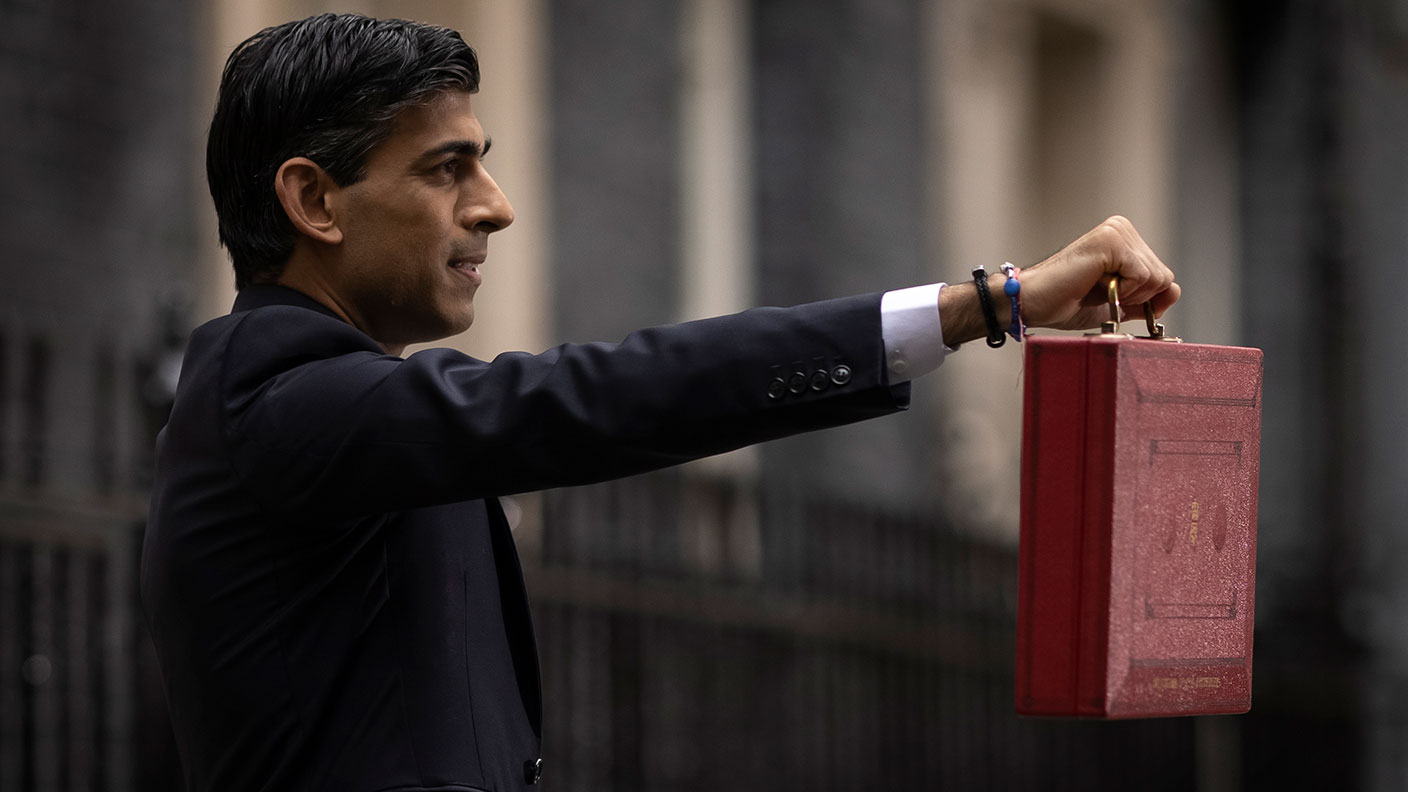Budget 2021: Here is what Chancellor Rishi Sunak announced
Rishi Sunak delivered his much anticipated Budget today. David Prosser explains what it means for you.


Get the latest financial news, insights and expert analysis from our award-winning MoneyWeek team, to help you understand what really matters when it comes to your finances.
You are now subscribed
Your newsletter sign-up was successful
Want to add more newsletters?

Twice daily
MoneyWeek
Get the latest financial news, insights and expert analysis from our award-winning MoneyWeek team, to help you understand what really matters when it comes to your finances.

Four times a week
Look After My Bills
Sign up to our free money-saving newsletter, filled with the latest news and expert advice to help you find the best tips and deals for managing your bills. Start saving today!
Anyone planning to raise a glass to Chancellor Rishi Sunak’s Budget should fill it with draught beer or sparkling wine rather than a strong red or a high-strength cider. His rationalisation of alcohol duties will reduce tax on the former – taking 3p off the cost of a pint, for example – but make higher-alcohol drinks more expensive.
It’s a common theme in this year’s Budget. The Chancellor is cutting air passenger duty in half, to just £6.50 on domestic flights, but introducing higher rates on longer trips, including a new £91 duty on ultra-long-haul flights. On fuel duties, he is freezing tax for the 12th year running, but actively spending money on electric vehicles, with £620m for public charging points.
Personal finances under pressure
In truth, these adjustments are minor, particularly in the context of the way in which the rising cost of living – inflation is now expected to average 4% next year – is hitting people’s personal finances. Here, the Budget confirmed some support for those on low incomes, including an increase in the minimum wage to £9.50 and a smaller reduction in universal credit as claimant’s income rises. But these won’t be enough to fully protect families from higher prices, or compensate in full for the end of the £20 universal credit top-up for those affected. Nor is there is any additional help for those on average earnings or more.
MoneyWeek
Subscribe to MoneyWeek today and get your first six magazine issues absolutely FREE

Sign up to Money Morning
Don't miss the latest investment and personal finances news, market analysis, plus money-saving tips with our free twice-daily newsletter
Don't miss the latest investment and personal finances news, market analysis, plus money-saving tips with our free twice-daily newsletter
Indeed, millions of people will be worse off when the Chancellor raises national insurance contributions by 1.25 percentage points next April to pay for NHS and social care funding. And the Budget confirmed that income tax thresholds will be frozen until the 2025-26 tax year, guaranteeing higher tax bills for those whose earnings rise.
Savers unmoved
For savers, there is not too much to get excited about in this Budget. The individual savings account (Isa) allowance will remain at £20,000 in 2021-22, while child trust fund and Junior Isa allowances will remain at £9,000. Savings below £5,000 will continue to qualify for the nil rate income tax band. Similarly, the capital gains tax system is unchanged and there are no adjustments to inheritance tax.
On pensions policy, the Chancellor was not keen to talk about the Government’s manifesto promise of a triple-lock increase in state pensions, which he suspended for the 2022-23 tax year in September. Budget documents reveal this change will save £5.4bn next year – but even more in future tax years, because state pensions will then rise from a lower base even after the triple lock returns.
As for private pensions, the Chancellor has followed the example of his predecessors, resisting the temptation to raise money by changing tax reliefs on pension contributions. Savers will be entitled to claim relief at their highest marginal rate of income tax, up to the annual allowance on contributions – the lower of £40,000 or your annual earnings for most people.
Still, two small-print changes could prove significant. First, Sunak is promising to look at waiving the maximum charge pension fund providers can levy on workplace pensions, so they can launch investment products in areas such as infrastructure. That could see some pensions become more costly, but also give savers a wider choice of investment funds. Second, the Chancellor is to close the “net pay anomaly” which makes it difficult for many low earners to claim the 20% tax boost on their pension contributions that everyone is in theory entitled to. That’s good news for savers on lower incomes, though the rules won’t change until 2024.
Business rates help for some small businesses
If the Chancellor was sparing with Budget measures affecting people’s personal finances, he also surprised entrepreneurs and small businesses with fewer changes than they might have expected.
For example, many businesses had hoped for an overhaul of the business rates system, but the Chancellor wants to finalise plans for new online sales taxes first. Still, for businesses occupying physical premises, next year’s freezing of the multiplier applied to business rate calculations will be welcome. And a new 50% relief for the retail, leisure and hospitality industries is aimed at those sectors hit hardest by the Covid-19 crisis. There is also additional support in the form of tax breaks on property improvements, particularly for green modifications.
Other support that could prove to be valuable to small businesses include the annual investment allowance, where the £1m yearly limit on tax-efficient investment in plant and machinery will be extended until 2023, and the continuation of the “super deduction”, which allows businesses to reduce their taxable profits when making investments. Nor will businesses with profits below £50,000 be subject to the new 25% corporation tax coming into force in 2023; they will continue to pay 19%.
On the downside, however, small businesses will see wage bills increase next April, as the minimum wage rises to £9.50 an hour and the 1.25 percentage point increase in employers’ national insurance contributions comes into effect.
Self-employed face higher tax bills
Self-employed workers also face the national insurance increase next year and will be disappointed to see no reforms to the IR35 system – blamed in part for labour supplies in many industries because self-employed workers are finding it difficult to comply. The Budget also confirmed the Chancellor is going ahead with the “base period reforms”, which affect how self-employed workers and partners file their tax reforms; this will raise £1.7bn over the next four years.
In addition, some campaigners are angry that the self-employed income support scheme, offering financial support to those hit by the pandemic, has not been extended. The Recovery Loan scheme, by contrast, has been extended beyond its 31 December cut-off point to 30 June, offering advances of up to £2m per business.
Finally, if you’re thinking about starting up a business, make sure you consider a wide range of funding possibilities. The Budget includes an extension of the Start-up Loans Scheme – through which entrepreneurs can borrow up to £25,000 for new ventures – for three more years.
Get the latest financial news, insights and expert analysis from our award-winning MoneyWeek team, to help you understand what really matters when it comes to your finances.

David Prosser is a regular MoneyWeek columnist, writing on small business and entrepreneurship, as well as pensions and other forms of tax-efficient savings and investments. David has been a financial journalist for almost 30 years, specialising initially in personal finance, and then in broader business coverage. He has worked for national newspaper groups including The Financial Times, The Guardian and Observer, Express Newspapers and, most recently, The Independent, where he served for more than three years as business editor.
-
 How a ‘great view’ from your home can boost its value by 35%
How a ‘great view’ from your home can boost its value by 35%A house that comes with a picturesque backdrop could add tens of thousands of pounds to its asking price – but how does each region compare?
-
 What is a care fees annuity and how much does it cost?
What is a care fees annuity and how much does it cost?How we will be cared for in our later years – and how much we are willing to pay for it – are conversations best had as early as possible. One option to cover the cost is a care fees annuity. We look at the pros and cons.
-
 What's behind the big shift in Japanese government bonds?
What's behind the big shift in Japanese government bonds?Rising long-term Japanese government bond yields point to growing nervousness about the future – and not just inflation
-
 Conservatives pledge to cut National Insurance again – how much could you save?
Conservatives pledge to cut National Insurance again – how much could you save?News A 2p reduction in National Insurance is a key feature of the Tory’s general election manifesto.
-
 UK wages grow at a record pace
UK wages grow at a record paceThe latest UK wages data will add pressure on the BoE to push interest rates even higher.
-
 Trapped in a time of zombie government
Trapped in a time of zombie governmentIt’s not just companies that are eking out an existence, says Max King. The state is in the twilight zone too.
-
 America is in deep denial over debt
America is in deep denial over debtThe downgrade in America’s credit rating was much criticised by the US government, says Alex Rankine. But was it a long time coming?
-
 UK economy avoids stagnation with surprise growth
UK economy avoids stagnation with surprise growthGross domestic product increased by 0.2% in the second quarter and by 0.5% in June
-
 Bank of England raises interest rates to 5.25%
Bank of England raises interest rates to 5.25%The Bank has hiked rates from 5% to 5.25%, marking the 14th increase in a row. We explain what it means for savers and homeowners - and whether more rate rises are on the horizon
-
 UK inflation remains at 8.7% ‒ what it means for your money
UK inflation remains at 8.7% ‒ what it means for your moneyInflation was unmoved at 8.7% in the 12 months to May. What does this ‘sticky’ rate of inflation mean for your money?